|
about us
Damascus, unlike other Islamic
cities, is distinctive for Islamic chanting that follows a specific
tradition dating back to hundreds of years - one founded by Sheik
Abdulghani Al-Nabolsi and adopted by Damascene chanters. Later on,
some valuable additions were brought into this tradition that became
one of the city's features.
Click here to view the C.V.
Early in the
twentieth century, many chanters with beautiful voices and wide
knowledge of music, like the passed-away Hajj Soleiman Dawood,
learned and transmitted the tradition across generations. His tutor
was the musician Saeed Farhat who composed a lot of religious songs
(Ibtihalat) and chants for him. Early
in 1951 Hajj S. Dawood started to do his performance by radio
and on air with the group he has already established in 1947.
The
group's first performance abroad took place in the Holy Mosque of
Aqsa, Palestine, on the 27th night (Laylatol Israa wal
Me'raj) of Ramadan 1956. The group received an in invitation from
Kuwait in 1964 to chant in many religious occasions and to record
some chants for the Kuwaiti radio. After that they were invited into
many Arab and foreign countries like Jordan, France (the Arab World
Institute, Paris, 1996) and the Netherlands (International Festivals
of Sufi Music, 1998).
In
1974 S. Dawood, along with the late Tawfiq Al-Monaj'jed and Hamza
Shak'kour, the best and most famous religious Sufi chanters then,
established the Association of Chanters in Damascus (Rabitatul
Monshideen). The Association, in coordination with the Ministry of
Awqaf, performed in all religious occasions the state celebrated.
The three aforementioned chanters were the leading chanters of the
three original groups composing the association.
The
first leader of the association was the late T. Al-Monaj'jed (1974 -
1998), then came the late S. Dawood (1998 - 2002) and then the late
H. Shak'kour (2002 - 2009). After his death, Shak'kour was succeeded
by Hamed S. Dawood, Soleiman's eldest son.
Hamed S. Dawood accompanied and learned from his father in his
childhood, and this atmosphere widely enriched his background. He
also received the arts of Arabic, music (from the late musician
Adnan Eloush), reciting, poetry and improvisation from the Sheikhs
(tutors) of Damascus -that established his good knowledge in the
deep-rooted art of chanting and put him in the right place. After
his father passed away he was able to establish his group that has
his name - Hamed S. Dawood Group, and now it is reputable and it
performs chanting in the different religious occasions in the Arab
and foreign countries. H. S. Dawood is also a graduate of Damascus
University - the Faculty of Mechanical Engineering.
Being committed to what his ancestors has started, Hamed S. Dawood
managed after H. Shak'kour to form a new core of the Association of
the Chanters. This came after the two talented chanters Imad Rami
(grandson of the famous chanter Mosallam Al-Bitar) and Ihab Akram
(grandson of Sheikh Kamel Baqdounes, a famous muezzin at Omayyad
Mosque, Damascus) joined the association.
The
new association undertook the mission of spreading and preserving
this tradition, that is part of Omayyad Mosque's tradition, and
chanting in religious occasions the state celebrates in coordination
with the Ministry of Awqaf, especially during the holy month of
Ramadan, and that are transmitted by radio and TV all during the
month.
|













